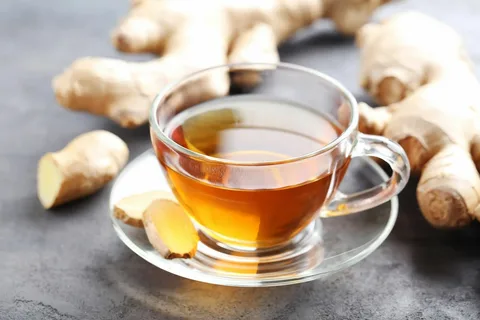Introduction to Ginger Tea
Ginger tea is a popular herbal beverage made by steeping fresh or dried ginger root in hot water. With its distinct spicy and aromatic flavor, ginger tea is enjoyed worldwide and is commonly consumed for its potential health-promoting properties. From soothing digestive issues to boosting immunity, ginger tea has a long history of use in traditional medicine practices.
Nutritional Profile and Health Benefits
Ginger root contains various bioactive compounds, including gingerol, shogaol, and zingerone, which contribute to its medicinal properties. Some potential health benefits of ginger tea include:
Digestive Health
Ginger tea is commonly used to alleviate nausea, indigestion, and motion sickness. It may also help relieve symptoms of gastrointestinal distress, such as bloating and gas.
Anti-inflammatory Properties
The bioactive compounds in ginger possess anti-inflammatory properties that may help reduce inflammation and alleviate symptoms of inflammatory conditions like arthritis.
Immune Support
Ginger contains antioxidants that can help strengthen the immune system and protect against oxidative stress.
Nausea Relief
Ginger tea is often recommended for pregnant women experiencing morning sickness or individuals undergoing chemotherapy-induced nausea.
Pain Relief
Some studies suggest that ginger may help alleviate menstrual cramps, muscle pain, and migraines due to its analgesic properties.
Potential Side Effects of Ginger Tea
While ginger tea is generally considered safe for most people when consumed in moderate amounts, some individuals may experience side effects, including:
Digestive Upset
Consuming large amounts of ginger tea may cause digestive discomfort, including heartburn, stomach upset, and diarrhea, especially in sensitive individuals.
Bleeding Risk
Ginger may have blood-thinning effects and could increase the risk of bleeding, particularly in individuals taking blood-thinning medications or with bleeding disorders.
Interaction with Medications
Ginger may interact with certain medications, including blood thinners, diabetes medications, and high blood pressure medications. It’s essential to consult with a healthcare provider before consuming ginger tea if you’re taking prescription medications.
Precautions and Considerations
Before incorporating ginger tea into your diet, consider the following precautions:
Pregnancy
Pregnant women should consult with a healthcare provider before consuming ginger tea, especially in large amounts, as it may affect pregnancy outcomes.
Allergies
Individuals with allergies to ginger or related plants, such as turmeric or cardamom, should avoid ginger tea to prevent allergic reactions.
Surgery
Stop consuming ginger tea at least two weeks before scheduled surgery, as it may increase the risk of bleeding during and after surgery.
How to Make Ginger Tea
Making ginger tea at home is simple and requires only a few ingredients:
Ingredients
- 1-2 inches of fresh ginger root (peeled and thinly sliced)
- 2 cups of water
- Optional: honey, lemon, or mint for flavor
Instructions
Bring the water to a boil in a saucepan.
Add the sliced ginger to the boiling water and reduce the heat to simmer.
Allow the ginger to steep in the water for 10-15 minutes.
Strain the tea into a cup and add honey, lemon, or mint to taste.
Enjoy your homemade ginger tea!
FAQs
Can ginger tea help with weight loss?
While ginger tea may support weight loss indirectly by aiding digestion and reducing inflammation, it’s not a magic solution for weight loss on its own. A balanced diet and regular exercise are essential for sustainable weight loss.
Is it safe to drink ginger tea every day?
In moderation, ginger tea is generally safe for daily consumption for most people. However, individuals with certain health conditions or those taking medications should consult with a healthcare provider before consuming ginger tea regularly.
Does ginger tea interact with blood pressure medications?
Ginger may interact with certain blood pressure medications, including calcium channel blockers and beta-blockers. It’s crucial to consult with a healthcare provider before consuming ginger tea if you’re taking medications for high blood pressure.
Can ginger tea help with menstrual cramps?
Some studies suggest that ginger may help alleviate menstrual cramps due to its anti-inflammatory and analgesic properties. Drinking ginger tea may provide relief from menstrual discomfort for some individuals.
Is ginger tea safe for children?
Ginger tea is generally safe for children in moderation, but it’s essential to consult with a pediatrician before giving ginger tea to young children, especially in large amounts.
Can ginger tea cause heartburn?
While ginger tea is often used to alleviate heartburn and indigestion, consuming large amounts of ginger tea may trigger heartburn or exacerbate existing digestive issues in some individuals.
Can ginger tea be consumed cold?
Yes, ginger tea can be enjoyed both hot and cold. Simply brew the tea as usual and allow it to cool before refrigerating. Add ice cubes and lemon or mint for a refreshing cold ginger tea.
Conclusion
Ginger tea is a flavorful and versatile beverage with potential health benefits, including digestive support, anti-inflammatory effects, and immune system support. While ginger tea is generally safe for most people when consumed in moderation, individuals with certain health conditions or those taking medications should exercise caution and consult with a healthcare provider before incorporating ginger tea into their diet. By understanding the potential benefits, side effects, and precautions associated with ginger tea, you can enjoy this soothing beverage as part of a healthy lifestyle.
- STYLE INSIDER – GRACE BELGRAVIA’S KATE PERCIVAL - April 23, 2024
- Is It Safe to Eat Moldy Bread? - April 23, 2024
- Is Seitan (Vital Wheat Gluten) Healthy? - April 23, 2024

